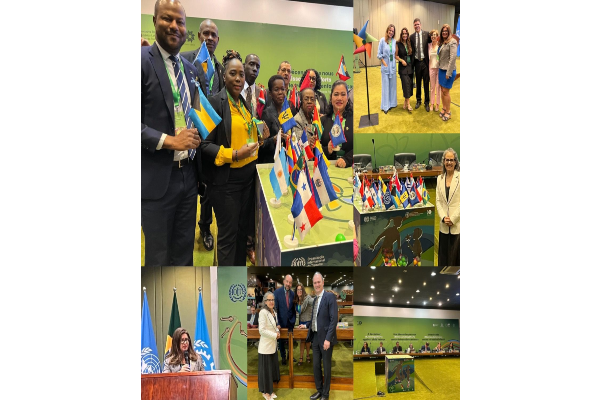
From 15 to 18 October, Brasilia will host the X Annual Meeting of the Focal Points Network of the Regional Initiative (RI) Latin America and the Caribbean Free of Child Labour. This event marks the 10th anniversary of this significant initiative, bringing together representatives from 31 countries across the region, as well as employer’s and worker’s organizations, the International Labour Organization (ILO), and development cooperation partners to discuss progress and challenges in eradicating child labour in the region.
Jointly organized by the Regional Initiative, the ILO, with the support of the Brazilian Cooperation Agency (ABC) of the Ministry of Foreign Affairs of Brazil, the Spanish Agency for International Development Cooperation, the Andalusian Agency for International Development Cooperation, and the United States Department of Labor, this hybrid annual meeting will be held at the Itamaraty Palace in Brasilia, Brazil. The event will be live streamed on the ILO Live platform, in Portuguese, English, and Spanish.
Child labour has increased globally, affecting 160 million children and adolescents, according to data from ILO and UNICEF. However, Latin America and the Caribbean have managed to halt this rise, making it the region with the most progress in the fight against child labour. Despite this, 8.2 million children and adolescents are still in this situation, with over 50% of them engaged in hazardous work, which threatens their health, education, and well-being. Furthermore, while statistics show a higher prevalence among boys, they fail to capture the hidden forms of child labour affecting girls and adolescent females, such as domestic work and some of the worst forms of child labour, including commercial sexual exploitation.
Against this background, the Regional Initiative has been a driving force in the elimination of child labour in Latin America and the Caribbean (LAC), even in the face of social crises that have deepened inequalities, especially for the most vulnerable groups. The countries participating in the Regional Initiative are more committed than ever to joining efforts to eradicate child labour and achieve Target 8.7 of the 2030 Agenda, which calls for the elimination of child labour in all its forms by 2025, making LAC the first region in the world free of child labour exploitation.
Anita Amorim from ILO PARTNERSHIPS recalled the ten years of the child labour initiative as she was present at the creation with the following words: “The poet Jorge Amado told us that poetry is not in the verse but in the heart, simply there are no words: it recalled that the life of each child labourer has no words to express this emotion”. Therefore this SSTC and triangular cooperation is even more timely today.
South-South Cooperation: A Key Driver in Combating Child Labor
The Regional Initiative exemplifies how South-South cooperation serves as a dynamic and effective tool for addressing shared challenges like child labor. This initiative is not just a framework for external assistance; it is a collaboration among countries with shared histories, economic conditions, and social challenges. By pooling their knowledge and resources, these nations develop solutions that reflect their unique contexts, moving away from aid dependency towards self-sustained development.
South-South cooperation is vital for enabling countries to exchange best practices and innovative solutions tailored to their specific needs. For instance, Brazil’s experience with the “Bolsa Familia” social protection program has inspired other countries to adopt similar cash transfer models that require families to keep children in school. This approach has proven effective in reducing the economic pressures that force children into labor.
These good practices have also facilitated peer learning among countries. Argentina, for example, has shared its advancements in promoting decent work in rural agricultural areas, where child labor is most prevalent. Innovations in agricultural production, combined with targeted social protection, have been adopted by neighboring countries, helping to diversify rural economies and reduce dependence on child labor. Uruguay and Paraguay have also benefited by adapting informal economy policies that extend social protections to vulnerable families at risk of child labor.
Trilateral Cooperation and Global Partnerships
A key component of the initiative’s success is trilateral cooperation, particularly between Brazil and Spain. Brazil, with its extensive experience in combating child labor, has provided technical expertise, while Spain has offered financial and technical support. This collaboration strengthens the participating countries’ ability to implement policies addressing the root causes of child labor, such as poverty and lack of education.
During the event, the Regional Observatory on Child Labour, a digital platform designed to monitor and guide countries’ efforts in preventing and eradicating child labour, will be launched.
At the X Annual Meeting, participants will address strategies to:
- Strengthen national and local policies for the eradication of child labour.
- Promote intersectoral interventions focused on decent work and quality education.
- Establish a regional monitoring and tracking system to generate evidence on the prevention and eradication of child labour.
- Mobilize financial and technical resources to sustain actions through 2030.
The event will also commemorate the 25th anniversary of ILO Convention No. 182 on the Worst Forms of Child Labour, adopted by the ILO’s tripartite constituents in 1999. In 2020, Convention No. 182 achieved universal ratification, marking the first time in ILO history that all 187 Member States ratified an international labour convention.
Media Contacts:
International Labour Organization (ILO) Office in Brazil
Ms. Denise Marinho
E-mail: santosd@ilo.org
Phone: +55 (61) 9 9868 7174
Regional Initiative for Latin America and the Caribbeam Free from Child Labour:
Mr. Rui de Jesús
E-mail: dejesus@ilo.org
Phone: +51 942 756 514
Brazilian Cooperation Agency (ABC)
Ms. Janaina Plessmann
E-mail: janaina.plessmann@abc.gov.br
Phone: + 55 (61) 996575513

